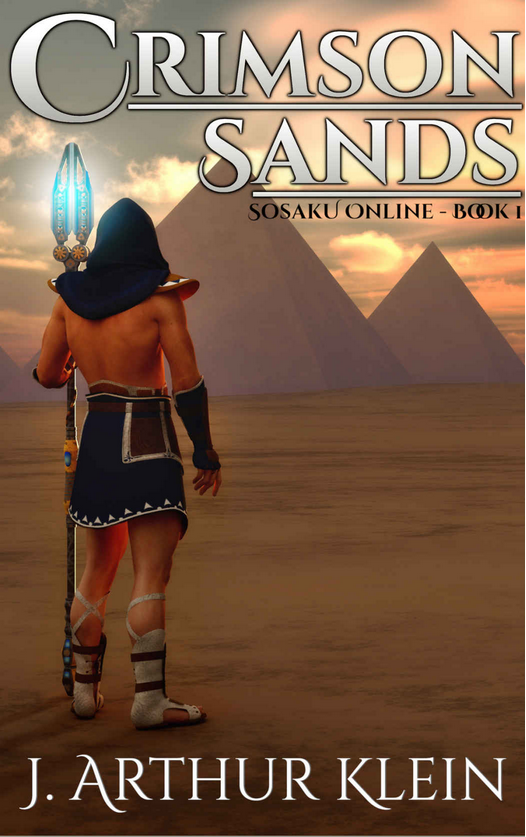
Review – Crimson Sands: Sosaku Online (Book 1)
If you’re looking for a book with big breasted lamias and paragraphs of discussion on hairy dwarf feet, this book will disappoint in every way. If you’re looking for a solid adventure in the LitRPG subgenre that features a likeable character who is smart enough not to hate but not so smart the system doesn’t pose a challenge, this is an easy book to sell you.
Consider purchasing this book from the above banner, or this link. The website may receive a commission if you do!
As a subgenre, LitRPG kind of struggles a bit with where it’s footing is. Do readers want to see so few stats that they are non-existent, to the point the story would be considered high fantasy if not for the game world mechanics used as a crutch? Do readers instead want pages upon pages of stat sheets, references to hard numbers and mechanics, and to see the mechanics of the world truly utilized? It can be hard for writers to find the right balance when even readers as individuals aren’t sure what they want. There is definitely a solid trend of stories written in a way that reminds the readers of times passed when they played traditional tabletop games with their friends, with carefully curated stories presented by Dungeon Masters in dynamics worlds that bent just enough to the player’s will that everyone at the table enjoyed themselves. I’d argue that stories that invoke this nostalgia are some of the best. That’s probably why, despite some early concerns going in, Crimson Sands has sold me as a must-read of the genre.
The story focuses on James, a college graduate who makes his money hunting for bugs and exploits in online games for “bounties” paid by the companies that program them. He also makes a fair chunk of change on subscriptions to his gaming channel (think of Youtube or Twitch, with the serial numbers filed off – but people are paying directly to see him, as opposed to having a sponsor or getting donations, which means he needs to be more conscious about the material he posts.) His interactions outside of the game world quickly establish the type of guy he is – a little fun loving, practical, smart, and one who hates cheaters. He takes care of his mother and younger sister, but has a tendency to lose himself.
A new game is announced, and due to some diligence on his part James gets in on the ground floor. Sosaku Online, interestingly enough, isn’t an Egyptian themed MMO (as we learn from a convention visited later in the book), but the area in which James’s character Kheph Sa’tep starts in is heavily inspired by Ancient Egyptian myths. He finds himself among such inspired character names as Kekekekek, Kilzjuu, and UrNewMasta. Steadily, James explores this new world as a priest-type character with more in common with Second Edition Dungeons and Dragons Clerics than any sort of priest class in any MMOs the kids are playing these days.
One of the things that “Playing a VR Game” style novels struggle with is the weight of the game world. The reader knows it’s a game world, the player knows its a game world… so why should we care what happens? I’d argue the writer here handles things in a solid manner. It’s more about the exploration than the weight of the world, although dumb mistakes gets James called out by his subscribers. Still, it’s clear that the game world has a more heavily old-world feel to it with alignments pitting races against each other in a way James is absolutely unwilling to play into. As a Saa, which is kind of a High Elf inspired race with the ears filed down, Kheph goes out of his way to help the very races that hate him because James is unwilling to play him as the holy-than-thou archtype the race is known for. It does a lot to showcase the player, and it adds depth to the world. Often, it strained me to believe that this style of gameplay would be found in a game millions of people were playing, with everyone getting to feel special, but there we were.
James’ choice to play a priest-style character makes sense for the player and the integration into the game world is solid. Kheph uses a spear and shield, and the mechanics behind both show an understanding of how these weapons were used historically in real life and how they are often portrayed in games. The mechanic of getting divine favor and “spending” it for boosts on a party or detriments upon enemies is thematically appropriate, yet is something often not explored in other stories of this type. Just as importantly, the game mechanics behind it are consistent and make sense. It was also refreshing to see the amount of discussion on different races and class archtyped brought up during the character creation process actually matter. It’s clear the author did his research both into traditional myths popular during the Ancient Egyptian Middle Kingdom period and the type of lore one would expect behind different playable races.
This book isn’t paint-by-the-numbers by any means, but behind its gloss and Ancient Egyptian veneer there are a lot of familiar beats. The main character is chosen with a special power, meets a mysterious love interest, his character dies in the game a few times but becomes stronger, and in the end he learns from his mistakes while seeing more of the game world. The beauty is that the execution, for the most part, is solid. I say this with one heavy caveat – I got this book when it first came out, and the first upload on Amazon was absolutely riddled with spelling errors and incorrect capitalizations. The author states this was an issue with formatting, and at the time of this review is working on having these errors fixed, but if you grab this book early and can’t mesh my glowing praise of the book with the number of “I” pronouns that aren’t capitalized, well, that’s why. That’s literally the worst two things I can say about this book: it is original in its presentation but not in its content itself, and maybe next time the author will listen to his wife when she edits for him.
There is a plot point at about the 80% mark I did not see coming. It’s heavy, and changes the dynamic of the game that James is playing while almost ironically bringing the story more in line with traditional tropes of the LitRPG genre. I still don’t know how I feel about this event, except to say that the author handled it with the gravity it deserved and I respect that. I have seen this type of plot point handled absolutely poorly in the past, so the handling of it was refreshing on point, at least. You’ll all know when you get to it what I’m talking about.
I feel that in the future, when people are asking “what is GameLit?” Crimson Sands will be known as one of the pillars, a solid book that hits the right notes of what players expect. Its game world is believable, its game systems make sense, and its story is engaging. An easy recommend.
Crimson Sands was written by J. Arthur Klein and is listed at 447 pages. It can be purchased as an e-book for $3.99, or as a physical edition book, from the Amazon store. It is also available to be read at no additional cost as part of a Kindle Unlimited subscription.




